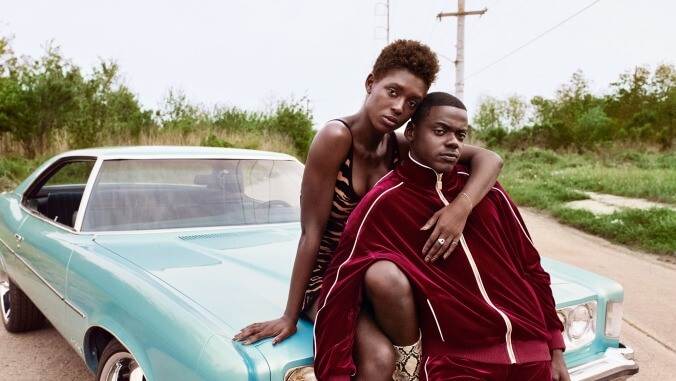There probably wouldn’t have been a second date for the photogenic, Tinder-crossed lawless lovers of Melina Matsoukas’ debut feature, Queen & Slim, if the first one hadn’t gone so wrong. They meet up on a cold night at a diner in Cleveland. She (Jodie Turner-Smith) is a disillusioned defense attorney with a confrontational personality. He (Daniel Kaluuya) is religious and more than willing to let a little thing like a waitress getting his order wrong slide. They seem like a bad match. But the evening has worse things in store for them than awkward conversation and a fumbling attempt at a pass.
He is driving her home in his car (the license plate is “TRUSTGOD”) when a cop pulls him over for failing to signal a turn. Things escalate from there with fatal consequences, as they have in so many cases involving traffic stops and trigger-happy police in America. Except that this time, it’s the cop who ends up cold and dead on the ground, shot with his own Glock. The couple—if we can even call them that at this point—go on the run. Their names are Angela and Ernest, but we don’t learn that until near the end of the film. For the most part, we only hear them referred to by the descriptions heard on police radios and TV news reports: “a black female” and “a black male.” But the title is Queen & Slim, so presumably that’s what we’re supposed to call them.
This is an intentional level of abstraction on the part of Lena Waithe’s screenplay, based, bizarrely enough, on a story idea by James Frey, the fabulist behind the infamous A Million Little Pieces. Having cut their hair and traded their clothes for hand-me-downs from Queen’s uncle Earl (Bokeem Woodbine), a pimp with PTSD, Queen and Slim become more like archetypes. Their deadly confrontation with the Cleveland cop, captured on a dash cam video that goes viral, eventually turns them into folk heroes when the officer’s own record of violence comes to light. They set their sights on Florida, where they hope to make a getaway to Cuba.
Running a languorous and indulgent 132 minutes, Queen & Slim plays less like a politicized chase thriller and more like a signage-conscious road movie crossed with a fashion look book. Queen and Slim visit New Orleans and Savannah; pass a gang of prisoners who labor in a field under the eye of an officer on horseback; drop in to dance and drink at an anachronistic rural honky-tonk joint. At no point do they appear to be in anything like danger, though they are recognized everywhere they go, by gas station attendants, car mechanics, and even sympathetic officers of the law—a fact that occasionally nudges the film into surreal territory.
Matsoukas is a veteran director of music videos who has more recently branched out into directing TV. (She and Waithe—better known as the creator of Showtime’s The Chi—previously worked together on the Emmy-winning Master Of None episode “Thanksgiving.”) Despite the topical subject matter, there is not much about her big-screen debut that can be called “confrontational,” apart from her habit of framing and cutting some of the early dialogue scenes in ways that appear alienating and disorienting. This approach is eventually dropped, presumably to signal the growing romance between Queen and Slim; it certainly isn’t evident in their screen chemistry. Kaluuya, a terrific performer whose Oscar-nominated breakthrough role in Get Out was a coup of acting through reaction, makes the most of a character who seems to have been underwritten on purpose. But Turner-Smith mostly comes across as wooden, and she’s the one who gets the thesis-stating, backstory-filling speeches.
Fortunately, one’s investment in Queen and Slim as characters is guaranteed risk-free; they’re about as un-subversive as renegade couples get, neither thrill-seeking nor antisocial. (They never even have to resort to violence.) For the most part, they are just good-looking people who do things that look good on camera. They dance under dim lighting. They ride horses. They take turns hanging out a car window while driving along the coastline. They stand around watching as a getaway truck goes up in flames.
Maybe it’s inevitable that the film ends up feeling like an extremely diluted combination of Matsoukas’ two most famous music videos, crossing the political imagery of Beyoncé’s “Formation” with the outlaw imagery of Rihanna’s “We Found Love”—though it’s nowhere as stylish as the former or as sexy as the latter, with which it shares the basic setup of a love scene in the front seat of a vintage Pontiac with the passenger door open. In Queen & Slim, said scene is intercut with an anti-police protest in a sequence of exceptional cheesiness. After what feels like an eternity of edits that parallel chanting, baton-rattling, and increasingly heated boning, it probably counts as good taste that Matsoukas chooses not to cut from the protest’s climactic gunshot to, say, an orgasm. But perhaps this is one of those moments where tastelessness should have prevailed. At least that would have been risky.

















![HBO teases new Euphoria, Larry David, and much more in 2026 sizzle reel [Updated]](https://img.pastemagazine.com/wp-content/avuploads/2025/12/12100344/MixCollage-12-Dec-2025-09-56-AM-9137.jpg)
























